consulting: Project selection
Virtual Heidelberg Laureate Forum 2020
For one week in 2020, about 500 people attended the virtual Heidelberg Laureate Forum (HLF), where selected young researchers from mathematics and computer science were able to interact with laureates of their disciplines. Laureates attending included winners of the Abel Prize, the ACM A.M. Turing Award, the ACM Prize in Computing, the Fields Medal, and the Nevanlinna Prize. Five con gressa staff members were present on site to support during the networking conference.
The event was orchestrated from the Computer Center of the University of Heidelberg with a pop-up studio able to offer editorial and technical support. An extensive scientific program was complemented by various interactive events such as office hours by the laureates which helped facilitate the exchange between the participants. The event also featured online exhibitions and film screenings as well as a poster session and evening talks which took place in a virtual reality environment. There was even a virtual after-conference party on the last evening (with dancing!).
Children of Doom
Giving science a special stage: that’s what the makers of Germany’s somewhat different kind of science festival “Children of Doom” are trying to do. The event took place in Berlin for the first time in May 2019.
At the premiere, there were various lectures and interactive formats on topics including artificial intelligence, robotics, genetic engineering, climate research and geosciences, accompanied by art installations, music and workshops in an interesting setting – and all with a steampunk flair. The theme focused on doomsday scenarios, which were to be countered or debunked in an entertaining way using solid scientific expertise.
con gressa advised the organizers on the conception of the scientific program for the 2019 festival.
Fotos: con gressa GmbH
EU-SciCon
2020 will be remembered as the year of the Corona pandemic – and thus also as the year in which the importance of science journalism for an informed public became abundantly clear worldwide. Individual scientists reached an audience of millions and became important advisors to policymakers and the public. At the same time, the pandemic exacerbated the already precarious economic situation of many media companies. Against this background, the European conference and event series “Science Journalism in the Digital Age” (EU-SciCon) took a look at the future of science journalism.
Various online lectures and discussions took place from fall 2020 to spring 2021. International media experts from Canada, the USA, Great Britain, Switzerland and Germany examined possible future options for journalism about science from different perspectives. All presentations were streamed live, recorded, transcribed and documented on the event website. The series concluded with an EU-SciCon working conference in Freiburg on May 12, 2021.
con gressa managed the website, organized the online events and supported the implementation of the final conference.
Tenure-Track Conference
The two-day tenure-track conference took place as a hybrid event both offline and online. At the conference venue, the Berlin-Brandenburg Academy of Sciences and Humanities, hygiene rules took the spotlight. Only very few participants were allowed on site, the half-empty rooms took some getting used to, and the required supply of fresh air made some people shiver.
The online room was on the other hand much more crowded. More than 400 participants followed the conference on the Internet. There was lively discussion via chat walls. Questions were read and answered by an “audience moderator” live. Some speakers were also present (only) online. And although technical measures had been taken to ensure that the panelists could see and hear each other both offline and online, it was not so easy to actively involve all participants in discussions. For the online audience, on the other hand, it worked well. Collaborative tools (padlets) that had been set up for the purely online workshops were also used extensively.
MINT-EC
With over 600 participants, the MINT-EC Excellence School Network held its virtual school principals’ conference on November 6, 2020, which also celebrated the network’s 20th anniversary. The gathering on the virtual event platform Let’s Get Digital (LGD) saved some CO2 – at least 62,579.66 kg! STEM-enthusiastic schools had the opportunity to present themselves and their projects at their own booths on the platform, and there were numerous networking opportunities. For example, more than 400 randomly generated conversations took place between two participants at a time in the platform’s so-called networking carousel. Personal video messages to the school principals came from Federal Minister Anja Karliczek and Prof. Dr. Christian Drosten, among others.
LGD was also used for the MINT-EC Digital Forum on February 26, 2021, and ensured that around 600 students and teachers were able to meet for a productive exchange. Other tools integrated into LGD enabled participants to interact and network in individually designed spaces, for example.
con gressa was responsible for the conceptual and organizational planning as well as for the technical support of the conferences.
Helmholtz-Zentrum Berlin
For the Helmholtz-Zentrum Berlin (HZB) we were tasked with holding several online events in different formats and we are happy to announce that we will again cooperate on holding the annual user meeting this year. The annual user meeting is primarily a networking event to intensify scientific exchange and to stimulate new cooperations. The meeting was fully digitized for the first time by con gressa in 2020. The all-in-one platform Let’s Get Digital was used for the conference.
con gressa is active in the area of conceptual and organizational planning for the HZB and is also responsible for technical support in the implementation of various formats including diversity workshops, scientific retreats, specialist conferences).
Institute of Medical Systems Biology
At the Berlin Institute of Medical Systems Biology (BIMSB), an institute of the Max Delbrück Center for Molecular Medicine (MDC), around 250 top researchers investigate how genes control the life of cells and thus influence health and disease.
The BIMSB is located in a new, architecturally impressive research building in Berlin-Mitte and at its grand opening on February 26, 2019, it was not only the architecture that German Chancellor Angela Merkel was attending for, but rather primarily to honour BIMSB’s outstanding research. The chancellor was able to see this for herself during her visit, which also included a tour of the laboratory.
Together with the team at the MDC, con gressa ensured that the opening was an exciting experience for everyone involved.
Fotos: David Ausserhofer (www.ausserhofer.de)
Alexander von Humboldt-Stiftung
con gressa has been organizing a variety of events for the Alexander von Humbold Foundation for many years – since 2020 nearly all of them online. Special times require special measures: in 2020 and 2021 con gressa designed and orchestrated, among other things, the foundation‘s annual conference as elaborate multimedia online events. Each running for two days, over 1,000 people from all over the world were able to network in a “virtual venue” and participate in up to 35 talks and workshops – with overwhelmingly positive feedback. In addition to the conceptual design of the event, con gressa also penned the script for the opening, managed the acquisition of speakers for the science talks, handled participation management and was responsible for the comprehensive technical support of the events.
Currently, we are responsible for the Foundation’s annual receptions, the meetings of the International Advisory Board and also the upcoming annual conference. We organize events within the framework of the Philipp Schwartz Initiative and the Humboldt Colloquia, which we hope will soon be held again in person throughout the world. Not only does con gress perform classic agency services such as complete event organization and budget monitoring, participation management, VIP support and designing of publications, we also complement each situation according to the specific requirements of the event format – depending on whether it is an on-site event, a hybrid format or a purely online event, con gressa has the expertise to (further) develop event formats.
Fotos: David Ausserhofer (www.ausserhofer.de), Jens Jeske
Consulting on digital formats
Since spring 2020, con gressa has been able to grow and develop their knowledge and experience on online events. Hundreds of people have already joined us in our webinars on strategies and tips for web events. In addition to these webinars, we consulted many organisation in individual sessions and contracts.
Among others, these include
Allgemeines Deutsches Wirtschaftsinstitut gemeinnützige GmbH,
Bildungsinitiative RuhrFutur,
Bundesanstalt für Materialforschung und -prüfung,
Deutsche Forschungsgemeinschaft,
Deutsche Lehrkräfteforum,
Deutschlandstipendium TU Berlin,
Exzellenzcluster CASA der RUB,
Frontiers of Research der Alexander von Humboldt-Stiftung,
Leibniz-Institut für Medienforschung,
Hans-Bredow-Institut Hamburg,
Max-Planck-Gesellschaft,
Robert Bosch Stiftung,
Technologie- und Methodenplattform für die vernetzte medizinische Forschung e.V.,
TH Köln,
Universität Hamburg Marketing GmbH etc.
Do you also need support designing your online event? Please feel free to contact us.

Bild © Pixabay von Pexels
Symposium Experiment Future
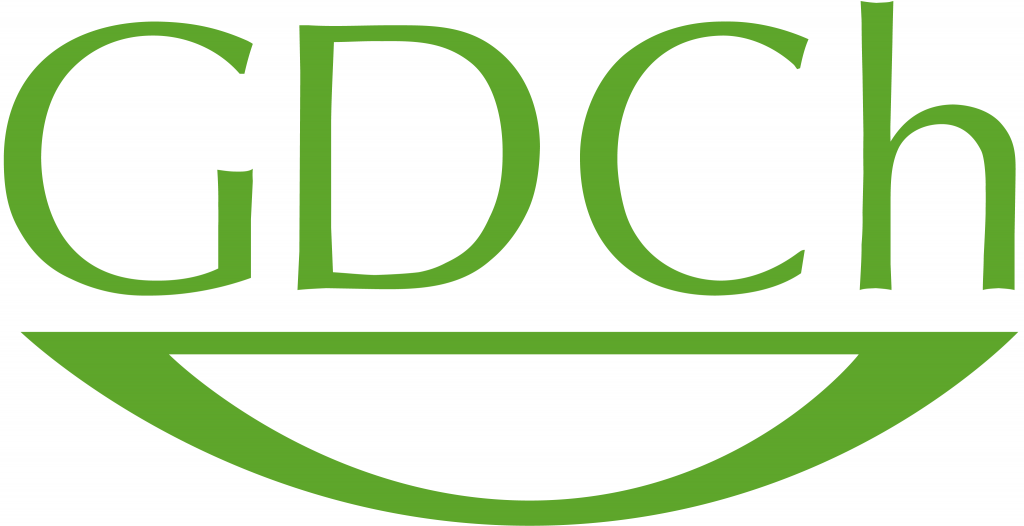
con gressa planned and organized the “Experiment Future” for the Gesellschaft Deutscher Chemiker (GDCh) twice consecutively – an event at which scientific and socio-political problems are examined and potential solutions are developed in workshops.
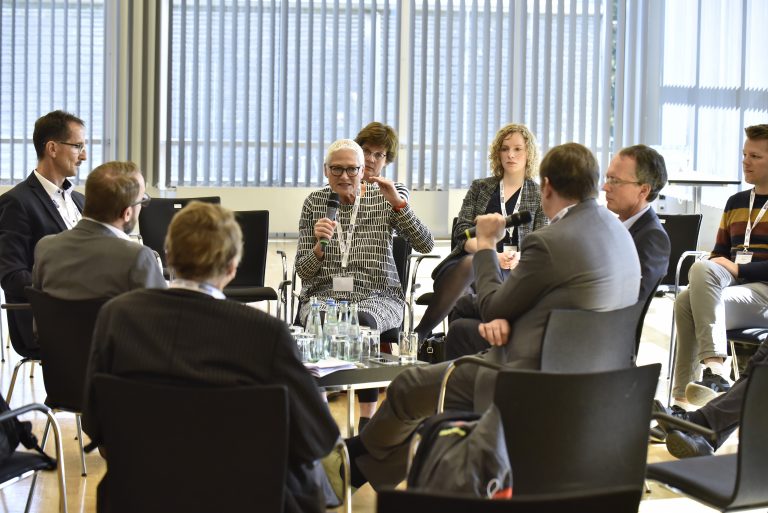
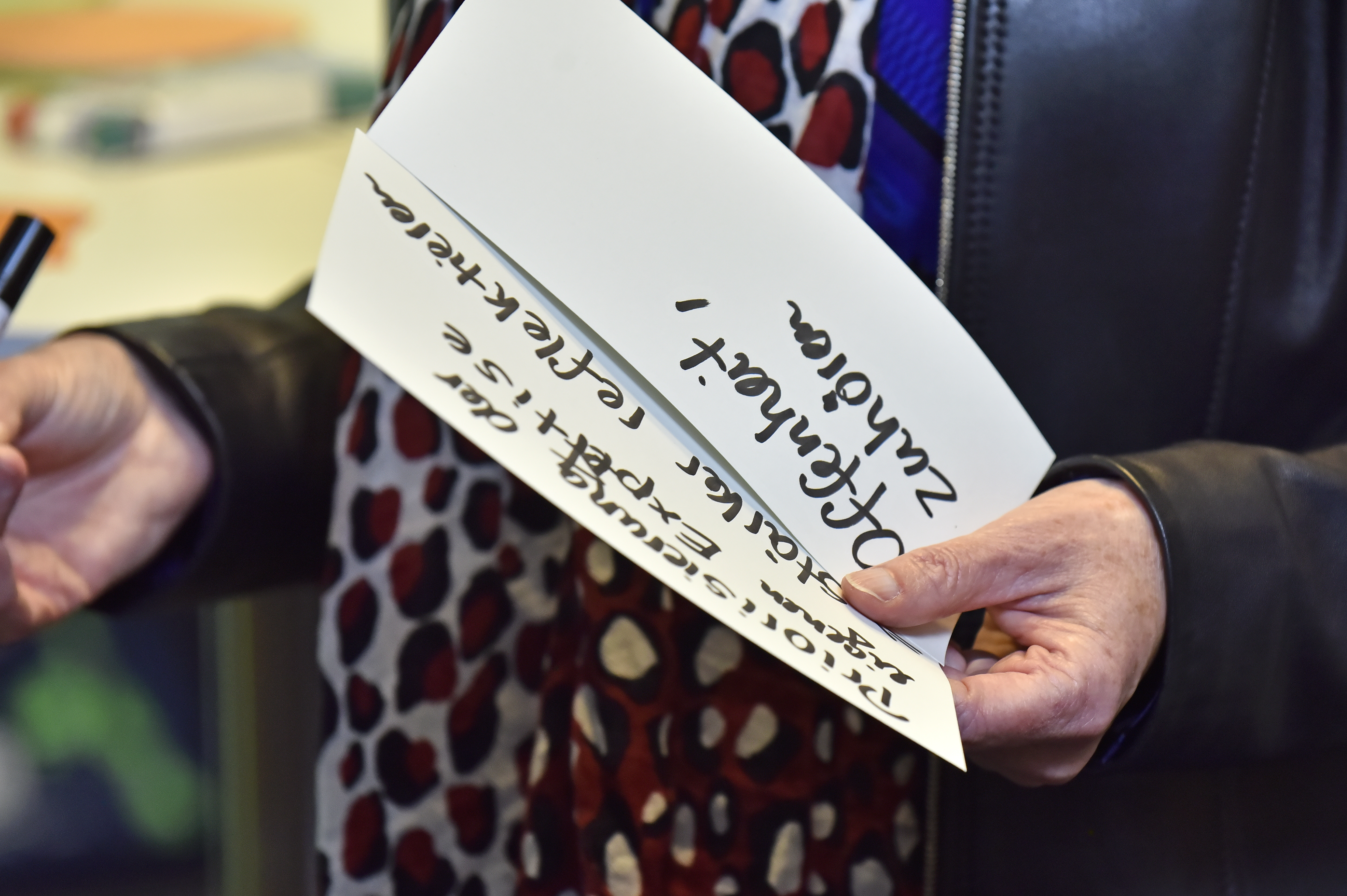
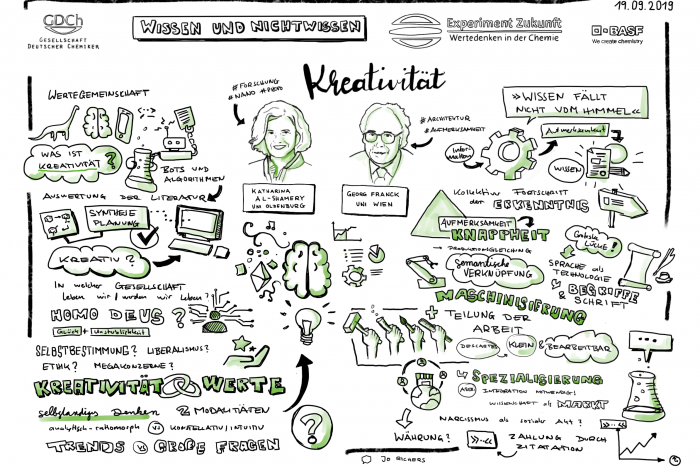
“Knowledge and non-knowledge” was the motto of the event in September 2019, which was approached by participants from various disciplines. On the occasion of the 150th anniversary of the GDCh in 2017, the topic “Wertedenken in der Chemie” (value thinking in chemistry) was the focus of attention. At the end of the annual science forum, the one-day, dialogue-oriented event focused on how the results of chemical research and development and the know-how of chemical experts can help overcome global challenges. After short keynote speeches, the participants were able to brainstorm and discuss various topics in a world café-style format. Participants took part in a fishbowl format or participated in the “House of Commons debate”.
con gressa consulted the GDCh on the formats and supported the event management on site.
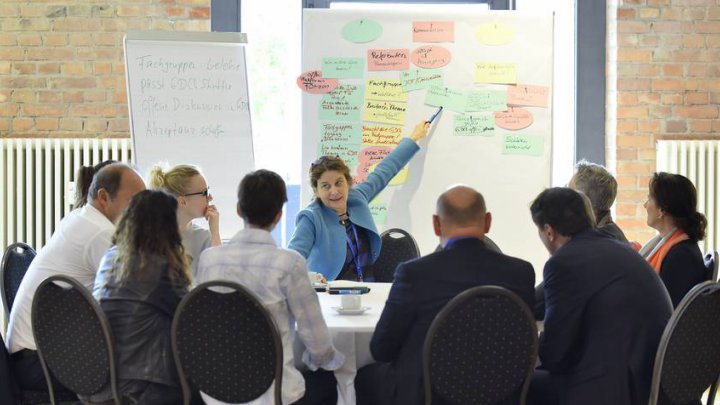
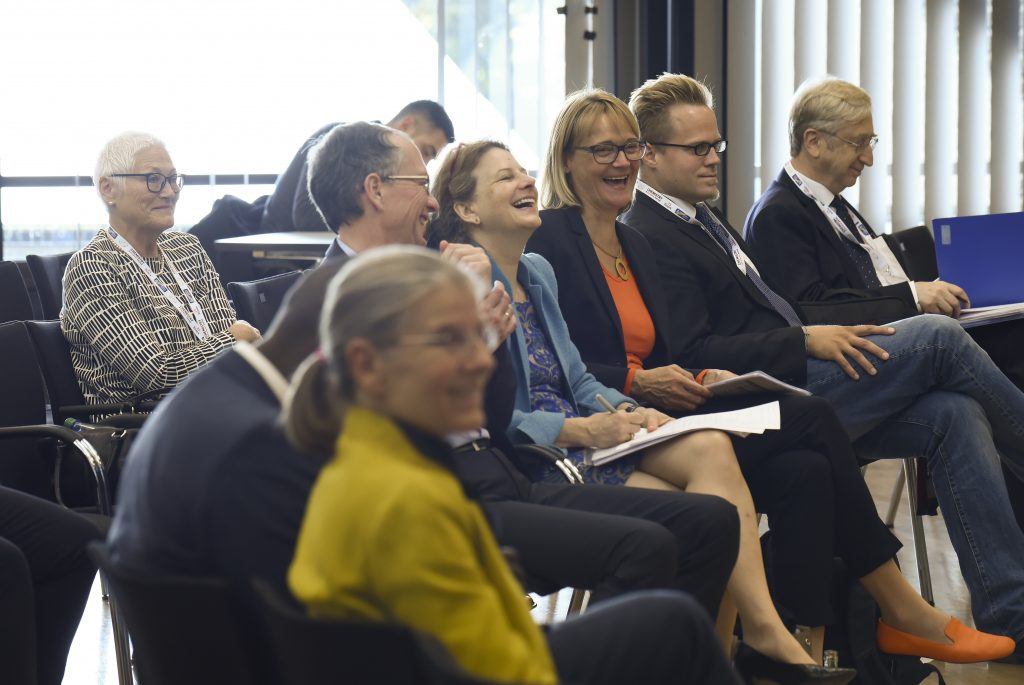
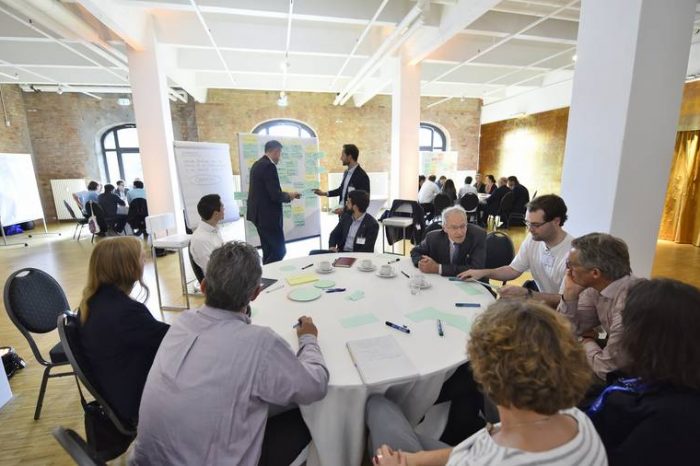
Copyrights pictures: GDCh, Christian Augustin, Hamburg / Graphic: Sketch notes by Dr. Johannes Richers (www.jorichers.com)
